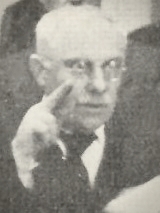Vladko Maček
| Vladko Maček | |
|---|---|

Maček takes an oath to become vice president of Yugoslav government-in-exile
|
|
| President of the Croatian Peasant Party | |
|
In office 8 August 1928 – 15 May 1964 |
|
| Preceded by | Stjepan Radić |
| Succeeded by | Juraj Krnjević |
| Deputy Prime Minister | |
|
In office 26 August 1939 – April 1941 |
|
| Prime Minister |
Dragiša Cvetković Dušan Simović |
| Succeeded by | Juraj Krnjević |
| Leader of the Opposition | |
|
In office 8 August 1928 – 26 August 1939 |
|
| Personal details | |
| Born |
20 July 1879 Jastrebarsko, Kingdom of Croatia-Slavonia, Austria-Hungary |
| Died | 15 May 1964 (aged 84) Washington, D.C., United States |
| Nationality | Croat |
| Political party | Croatian Peasant Party |
| Relations | Stanisław Maczek (cousin) |
| Alma mater | University of Zagreb |
| Occupation | Politician, lawyer |
| Religion | Roman Catholic |
Vladimir "Vladko" Maček (20 June 1879 – 15 May 1964) was a Croatian politician active within the Kingdom of Yugoslavia in the first half of the 20th century. He led the Croatian Peasant Party (HSS) following the 1929 assassination of Stjepan Radić, and through World War II.
Maček was born into a Slovene-Czech family in the village of Kupinec near Jastrebarsko, southwest of Zagreb. The famous Polish general Stanisław Maczek was his cousin. In 1903, he earned a law degree at University of Zagreb. After clerking at various Croatian courts he opened a private law practice in 1908 in Sv. Ivan Zelina. He joined the Croatian Peasant Party at its founding. After World War I, during which he served in the Austro-Hungarian Army, he became a close associate of Stjepan Radić. In 1925, after Radić's visit to Moscow and the Croatian Peasant Party joining the Peasants International, Maček was arrested by the Royal Yugoslav authorities. While in jail, he was elected to the National Assembly. In July 1925, after HSS had joined the government, Maček was released.
Maček became the leader of the party on 13 August 1928 following Radić's assassination. He quickly became a main opponent of King Alexander and was arrested in April 1933 and sentenced to three years in jail for treason.
Maček was released following Alexander's assassination in 1934. His stated aim during that period was to transform Yugoslavia from a unitary state, dominated by ethnic Serbs, into a new form of state organization in which Croatian statehood would be restored. His ideas appealed to a majority of Croats, and the Croatian Peasant Party gradually gained popularity. He nurtured close relations with other opposition parties in Yugoslavia and, although his coalition lost elections in 1938, it remained a force for reckoning. His persistence and political skills finally paid off in August 1939 with Dragiša Cvetković in the Cvetković-Maček Agreement and the creation of the Banate (Banovina) of Croatia, a semi-autonomous entity which contained Croatia and large sections of today's Bosnia and Herzegovina. HSS became part of the coalition government while Maček himself became deputy prime minister of Yugoslavia.
...
Wikipedia
